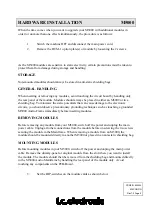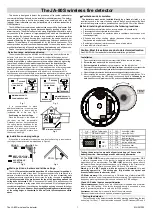
3 Important Safety Information
3.8 Cleaning and Care
ATTENTION!
Do not wet clean the appliance! Penetrating water can cause considerable dangers to
the user (e.g., electric shock).
Liquid can destroy the electronics of the device! Liquid penetrates into the housing
of the device and can cause a short circuit of the electronics.
Only clean with a soft, dry cloth. Never use solvents or cleaners.
3.9 Prevention of ESD Damage
ATTENTION!
The designation ESD (Electrostatic Sensitive Devices) refers to measures which are used
to protect electrostatically endangered components from electrostatic discharge and thus
to prevent destruction. Systems and assemblies with electrostatically endangered components
usually have the following characteristics:
Indicator for assemblies with electrostatic endangered components
The following measures protect electrostatically endangered components from destruction:
Prepare removal and installation of assemblies
Unload yourself (for example, by touching a grounded object) before touching assemblies.
Ensure that you wear a grounding strap on the wrist when working with such assemblies, which
you attach to an unpainted, non-conductive metal part of the system.
Use only tools and devices that are free from static electricity.
Transporting Assemblies
Assemblies may only be touched at the edge. Do not touch any pins or conductors on assemblies.
Installing and Removing Assemblies
Do not touch persons who are not grounded while removing or installing components. This could
result in a loss of grounding protection from your electrostatic discharge.
Storing Assemblies
Always keep assemblies in ESD protective covers. These protective covers must be undamaged.
ESD protective covers, which are extremely wrinkled or even have holes, no longer protect against
electrostatic discharge.
ESD protective covers must not be low-resistance and metallically conductive if a lithium battery
is installed on the assembly.
microSync
Date: 22nd June 2020
21
















































